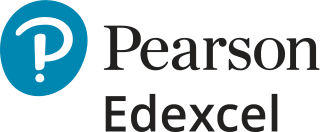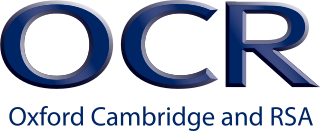Related Research Articles

The General Certificate of Secondary Education (GCSE) is an academic qualification in a range of subjects taken in England, Wales and Northern Ireland, having been introduced in September 1986 and its first exams taken in 1988. State schools in Scotland use the Scottish Qualifications Certificate instead. However private schools in Scotland often choose to follow the English GCSE system.

The Qualifications and Curriculum Development Agency (QCDA) was a charity, and an executive non-departmental public body (NDPB) of the Department for Education. In England and Northern Ireland, the QCDA maintained and developed the National Curriculum and associated assessments, tests and examinations, advising the minister formerly known as the Secretary of State for Education on these matters.

The City and Guilds of London Institute is an educational organisation in the United Kingdom. Founded on 11 November 1878 by the City of London and 16 livery companies – to develop a national system of technical education, the institute has been operating under royal charter (RC117), granted by Queen Victoria, since 1900. The Prince of Wales, later King Edward VII, was appointed the first president of the institute.

AQA Education, trading as AQA, is an awarding body in England, Wales and Northern Ireland. It compiles specifications and holds examinations in various subjects at GCSE, AS and A Level and offers vocational qualifications. AQA is a registered charity and independent of the government. However, its qualifications and exam syllabi are regulated by the Government of the United Kingdom, which is the regulator for the public examinations system in England and Wales.

Edexcel is a British multinational education and examination body formed in 1996 and wholly owned by Pearson plc since 2005. It is the only privately owned examination board in the United Kingdom. Its name is a portmanteau term combining the words education and excellence.

Oxford, Cambridge and RSA Examinations (OCR) is an examination board that sets examinations and awards qualifications. It is one of England, Wales and Northern Ireland's five main examination boards.

WJEC is an examination board providing examinations, professional development and educational resources to schools and colleges in Wales, England and Northern Ireland under its own name and the Eduqas brand.

CELTA is an initial teacher training qualification for teaching English as a second or foreign language (ESL and EFL). It is provided by Cambridge Assessment English through authorised Cambridge English Teaching Qualification centres and can be taken either full-time or part-time. CELTA was developed to be suitable both for those interested in Teaching English as a Foreign Language (TEFL) and for Teaching English to the Speakers of Other Languages (TESOL). The full name of the course was originally the Certificate in English Language Teaching to Adults and is still referred to in this way by some course providers. However, in 2011 the qualification title was amended on the Ofqual register to the Cambridge English Level 5 Certificate In Teaching English to Speakers of Other Languages (CELTA) in order to reflect the wider range of students that teachers might have, including younger learners.

The International General Certificate of Secondary Education (IGCSE) is an English language based secondary qualification similar to the GCSE and is recognised in the United Kingdom as being equivalent to the GCSE for the purposes of recognising prior attainment. It was developed by Cambridge Assessment International Education. The examination boards Edexcel, Learning Resource Network (LRN), and Oxford AQA also offer their own versions of International GCSEs. Students normally begin studying the syllabus at the beginning of Year 10 and take the test at the end of Year 11. However, in some international schools, students can begin studying the syllabus at the beginning of Year 9 and take the test at the end of Year 10.
Cambridge Assessment English or Cambridge English develops and produces Cambridge English Qualifications and the International English Language Testing System (IELTS). The organisation contributed to the development of the Common European Framework of Reference for Languages (CEFR), the standard used around the world to benchmark language skills, and its qualifications and tests are aligned with CEFR levels.
C1 Advanced, previously known as Cambridge English: Advanced and the Certificate in Advanced English (CAE), is an English language examination provided by Cambridge Assessment English (previously known as Cambridge English Language Assessment and the University of Cambridge ESOL examination).
Trinity College London, established in 1872, is a leading international exam board, publisher and independent education charity. Since 1938 Trinity has been offering English language assessments taken by over 850,000 candidates in over 60 countries each year.

Trinity College London (TCL) is an examination board based in London, United Kingdom which offers graded and diploma qualifications across a range of disciplines in the performing arts and English language learning and teaching. Trinity College London has examined over 850,000 candidates in more than 60 countries worldwide. It is a registered charity in England, Wales and Scotland, and its Patron is HRH The Duke of Kent.
Pearson PLC offers various international standardized test of English language proficiency for non-native English language speakers. The tests include the Pearson Test of English Academic, the PTE General, and PTE Young Learners. These are scenario-based exams, accredited by the QCA and Ofqual, and are administered in association with Edexcel.

The Office of Qualifications and Examinations Regulation (Ofqual) is a non-ministerial government department that regulates qualifications, exams and tests in England. Colloquially and publicly, Ofqual is often referred to as the exam "watchdog".
The General Certificate of Education (GCE) Advanced Level, or A level, is a main school leaving qualification in England, Wales, Northern Ireland, the Channel Islands and the Isle of Man. It is available as an alternative qualification in other countries.
Signature is a United Kingdom national charity and awarding body for deaf communication qualifications. Signature attempts to improve communication between deaf, deafblind and hearing people, whilst creating better communities.
The Confederation of Tourism & Hospitality (CTH) is a specialist awarding organisation, offering vocational qualifications for the hospitality, culinary and tourism industries, worldwide.

Christabel Burniston MBE founded the English Speaking Board (ESB). She was a pioneer in oral communication and the language arts, who championed the importance of spoken English as a vital life skill, describing it as enabling: "effective relationships with others, and insight into human relationships".
A2 Key, previously known as Cambridge English: Key and the Key English Test (KET), is an English language examination provided by Cambridge Assessment English.
References
- 1 2 "Christabel Burniston". Telegraph. 2006-11-23. Retrieved 2013-04-13.
- ↑ "Newsom report, Half Our Future, 1963". Archived from the original on June 18, 2010.
- 1 2 "Christabel Burniston - Obituaries". The Stage. Retrieved 2013-04-13.
- ↑ "Accustomed as I am . ". Telegraph. 2003-04-12. Retrieved 2013-04-13.
- ↑ "English Speaking Board assesses local students". timesofmalta.com. 2009-06-07. Retrieved 2013-04-13.
- ↑ "ESBI - UK exam boards offering English language exams - Exams - Learning". British Council. Archived from the original on 2013-08-25. Retrieved 2013-04-13.
- ↑ "The Register of Regulated Qualifications - View Organisation : ESB (English Speaking Board (International) Ltd)". Register.ofqual.gov.uk. 2010-04-01. Retrieved 2013-04-13.
- ↑ "Learn English Online". Monday, 13 September 2021